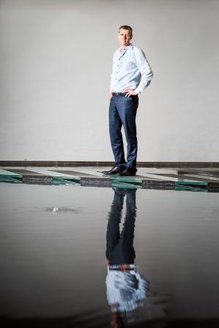- Education
-
Research
Current research
Talent
-
Collaboration
Businesses
Government agencies and institutions
Alumni
-
About AU
Organisation
Job at AU
Henrik Østenkjær Lind is a pioneer and an entrepreneur when it comes to trading electricity. Today, the 38-year-old banker, who switched his business and became a billionaire, was awarded Alumni of the Year honors at the BSS Reunion Day.
2013.06.07 |
Eleven years ago, Henrik Østenkjær Lind made a decision. A life changing decision that would turn his life upside-down.
It all started with a report that had landed on his desk at his workplace, Jyske Bank. It was a report on how the market was beginning to open in the electricity sector. Henrik Lind found himself reading the full report, and when he reached the end, and the conclusion was that the electricity sector had a lot of unexplored opportunities, he came to his own conclusion.
- The bank itself wasn’t going to focus on that area. Understandable enough, since it’s a bank. But companies were looking for portfolio managers for trading electricity, and so it happened that I ended up in one of these companies, Henrik Lind remembers.
During four years, he was employed at Energi Danmark, where he developed his own thoughts and ideas of how to deal with the electricity trade.
It was these ideas, that drove him to his next big decision: Henrik Lind wanted to start something up on his own.
And so he did.
Today, Henrik Lind has 280 employees in his company, Danske Commodities, which he founded in 2004. Since then, the company has been received several awards (among these, two Gazelle awards) for its extreme growth, and last year Henrik Lind came in 63rd on the list of the wealthiest people in Denmark.
In many ways, Henrik Lind believes that he owes a lot of his success to Aarhus University. During his years at Energi Danmark, the ambitious trader took evening lessons and earned an HD Diploma in Finances.
Most days, Henrik Lind would work for eight hours, travel to school for one hour and attend four hours of lessons, before traveling the one hour back home.
He remembers how he hated the hard work, and his strategy was to simply show up and sort out the most relevant information.
- A few weeks before we finished, I actually came very close to quitting. But then I looked in the calendar and saw that it would soon be over. What I learned during those years at Aarhus University turned out to be indispensable when I built up my business, says Henrik Lind.
And in fact, that isn’t the only reason why the owner of Danske Commodities is grateful to Aarhus University. Each month, Danske Commodities hires no less than 5 to 10 new people, who has a degree from AU.
- We are able to attract a lot of talent from AU. They are skilled and very highly educated, says Henrik Lind and points out that the bright minds from AU are part of the key to his success with Danske Commodities. The other part, he gladly shares as well:
- Of course, a talented crew doesn’t make a business itself. To do that, you need to get a lot of ideas from these people, and give them the freedom to explore their ideas. If you are able to structure that in a market with a lot of opportunities, you have some kind of a key to success, Henrik Lind says.
But even though he must be considered as one of those people who holds one of these coveted keys, all doors aren't easy to open.
- Things were quite simple, when I hired the first guy in the office. It was still quite simple, when we were twenty. And maybe also forty. But now there are 280 of us, and it is not possible to organize the same way anymore. We reorganize continually to keep the organization flexible, and we keep making sure that everyone gets the responsibility they want, Henrik Lind says.
As this years newly awarded Alumni of the Year, Henrik Lind would like to share a piece of advice for those who are about to finish their education and join the business world themselves. Especially those who have an entrepreneur hidden inside:
- If it feels right in your stomach, then go for it. But before you go ahead, make sure your ideas are double checked. That could be done by some of your student classmates, a former colleague, or somebody with knowledge in the industry. That way, you can make sure you don't pursue the wrong ideas. If you feel you've got it right, you get good feedback, and it tickles a little bit in your stomach, then you should go for it, Henrik Lind advises.
Henrik Østenkjær Lind